Vitamins B group is very important to the human body. These vitamins are an integral part of the diet because they are responsible for your growth and development. Not all B vitamins have the same function. In addition, B vitamins come from different foods. Therefore, in addition to getting enough vitamin B, we also have to balance the ratio between the types of B vitamins loaded into the body. Here is the Vitamin B-Group foods list.


1. Vitamin B-Group foods list.
1.1 Vitamin B1 foods list
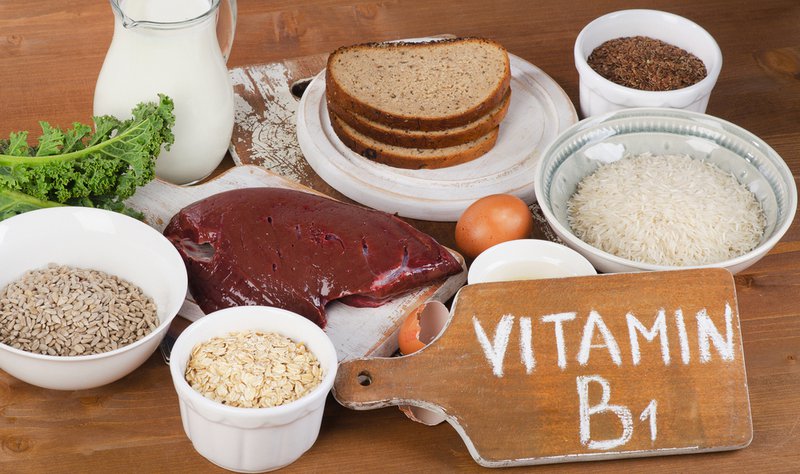

- Beef: 100 grams of steak gives you 7% of the daily value of vitamin B1. On the other hand, beef liver is high in vitamin B1 which will give you about 10% of this essential nutrient. Moreover, beef is known for its high iron content, and it is an excellent source of other essential nutrients, such as B12, zinc, and selenium.
- Pork: In addition to beef, vitamin B1 can be found in other common meats. The concentration of vitamin B1 in pork is even higher than beef because 100 grams of pork has 27% of vitamin B1. This type of meat is also an excellent source of other B vitamins and several important minerals, like selenium and zinc.
- Salmon: Salmon can give you some health benefits because it is rich in protein, omega-3 fatty acids, and vitamin D. In addition, a serving (100 grams) of cooked salmon has 18% of the price. Daily vitamin B1 treatment for you.
- Tuna: A 100-gram serving of cooked tuna gives you 13% of the vitamin B1 value. It is also a good source of omega-3 fatty acids, vitamin D, and selenium.
- Black beans: Black beans are often high in protein and fiber. They also contain a lot of B vitamins. Half a cup of black beans provides 27% of the daily value of vitamin B1 for you.
- Squash: A half-cup of squash can provide you with 13% of the B1 vitamin. A good thing about this fruit is that it has no cholesterol while it is rich in vitamins and minerals.
- Sunflower seeds: Sunflower seeds are an excellent source of vitamin B1. Just 30 grams of baked seeds has 7% of the amount of vitamin B1. Moreover, they contain other B-complex vitamins and are high in vitamin E.
- Barley: Foods rich in vitamin B1 also include grains like barley. In one grain, you will get 7% of the daily value of this vitamin. Furthermore, barley is an excellent source of fiber and some essential minerals, like manganese and selenium.
- Brown rice: Whole grain rice also belongs to foods that contain vitamin B1. Half a cup of cooked brown rice has 7% of vitamin B1 for you. In addition, it contains other B-complex vitamins such as riboflavin, niacin, vitamin B5, and vitamin B6.
- Dairy products: Dairy products are a good source of vitamin B1 food. A cup of milk serves 7% of vitamin B1 for you. And milk is one of the best sources of calcium but is also rich in other B vitamins, including vitamin B12 and riboflavin.
1.2 Vitamin B2 foods list
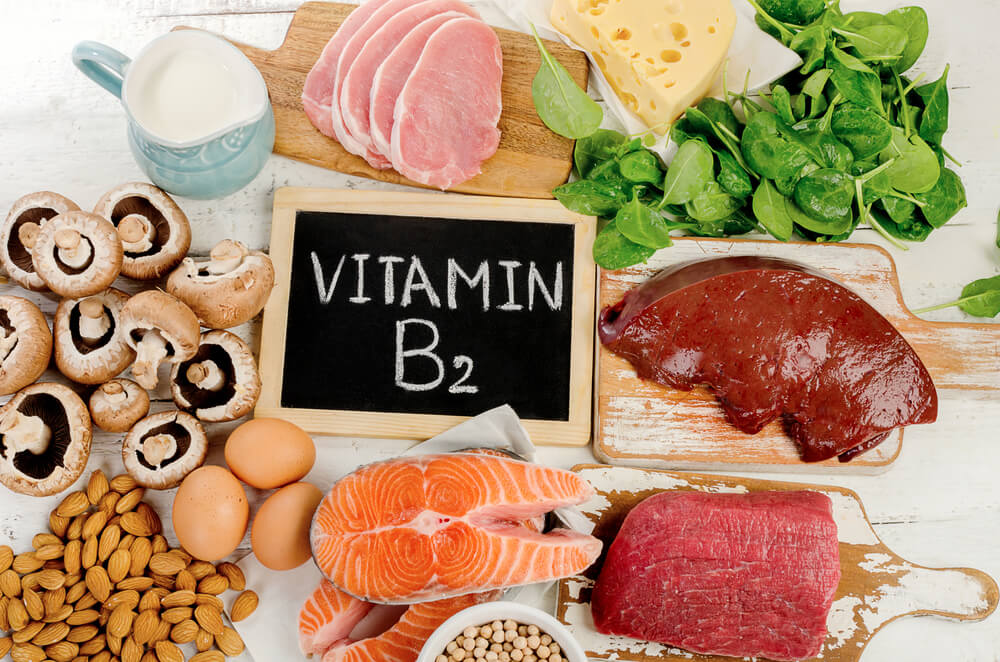

- Red meat is a very rich source of vitamin B2. Meat provides enough vitamin B2, meeting about 12% of the recommended daily value.
- Almonds: Almonds are a nutritious, vitamin, and mineral-rich food. Almonds are the best source of vitamin B2 – 60% of the daily recommended value.
- Mushrooms: Mushrooms are rich in vitamin B2. 100 grams of mushrooms will provide you with about 29% of vitamin B2.
- Mackerel is a rich source of vitamin B2. 85g of mackerel will provide about 0.49mg of this vitamin. Other types of fish like salmon and tuna also contain large amounts of vitamin B2.
- Eggs: Eggs are a rich source of protein and other nutrients. A hard-boiled egg contains 15% of vitamin B2.
- Broccoli is a good source of vitamins and antioxidants. 100 grams of broccoli contains 10% of the amount of vitamin B2.
- Sesame seeds: is a rich source of vitamin B2, 27% of vitamin B2 in 100 grams of sesame seeds. They are also rich in fatty acids and contain minerals like iron, calcium, magnesium, zinc, and selenium. In addition, sunflower seeds and pumpkin seeds are also rich in vitamin B2.
- Cheese: is a rich source of vitamin B2. 100 grams of cheese provides about 81% of the daily recommended value.
- Milk: is rich in vitamin B2 and other complex B vitamins. A cup of whole milk contains 26% of vitamin B2.
1.3 Vitamin B3 foods list
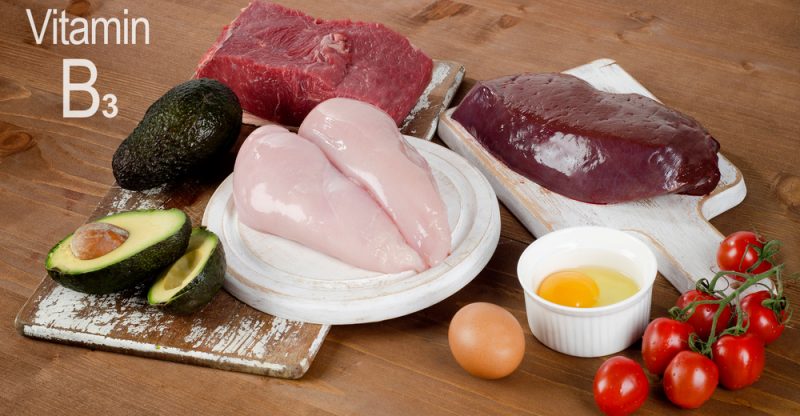

- Fish is one of the best sources of vitamin B3. Among fish, tuna is particularly high in vitamin B3, providing 110% of the daily recommended amount of vitamin B3. Much other fish that also contain niacin are mackerel and salmon. In addition to vitamin B3, they also contain lots of omega-3 fatty acids and proteins.
- Pork: Pork contains a high content of vitamin B3. A 100g serving of cooked lean pork meets 54% of the daily recommended amount of vitamin B3.
- Mung beans: Vegetarians do not need to worry about getting vitamin B3 every day because there are many vegetables that contain niacin like green beans. A 100g serving of green beans provides 10% of the daily recommended amount of vitamin B3.
- Mushrooms: All mushrooms are good sources of vitamin B3.
- Cauliflower: Cauliflower is the best natural source of vitamin B3. In addition to providing niacin to the body, broccoli also contains fiber, antioxidants, and other important nutrients.
- Asparagus: Asparagus is beneficial to human health. It contains many essential nutrients for the body. In addition to vitamin B3, asparagus also contains more fiber, protein, glucose, vitamins K, C, A, pyridoxine (B6), riboflavin (B2), thiamin (B1), folic acid, minerals necessary for the body. human-like potassium, magnesium, calcium, iron, zinc … Very good for pregnant mothers and also a natural remedy very useful for sex life …
1.4 Vitamin B6 foods list
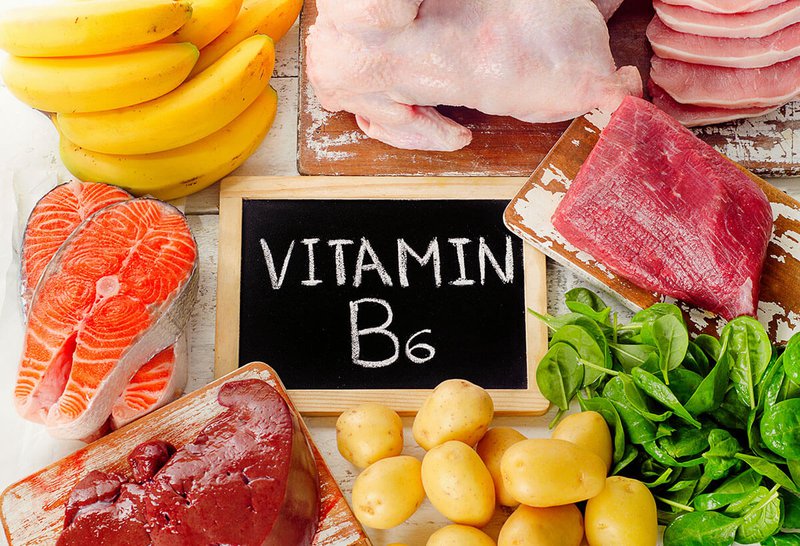

- Milk: A glass of cow or goat’s milk provides 5% of the recommended daily intake of vitamin B6. Milk also contains very high amounts of vitamin B12 and calcium, which is good for your health.
- Meat: Poultry like turkeys provides a good deal of vitamin B6. Beef also contains high levels of vitamin B6, along with many different nutrients. Eat meat once or twice a week to reduce vitamin B6 deficiency.
- Salmon: is one of the fish that contains the most vitamin B6, in addition, it is also a source of many other B vitamins, omega-3 fatty acids, and proteins.
- Eggs: Two eggs provide 10% of the recommended daily value of vitamin B6. In addition, eating eggs also help supplement many nutrients and protein.
- Chicken liver: a food rich in nutrients and high in protein, folate, vitamin A, vitamin B6, and vitamin B12.
- Carrots: Carrots provide vitamin B6, fiber, and a high amount of vitamin A. You can eat fresh or cooked carrots.
- Raspberry: Raspberry contains vitamin B6 that helps create antibodies that prevent infection and disease. This leafy green vegetable also has many other vitamins like vitamins A and C. Raspberry also contains iron which is necessary for the formation of new blood cells.
- Sweet potatoes: Sweet potatoes are a nutritious food. A medium-sized sweet potato provides 15 percent of the daily value of vitamin B6. It also contains a lot of fiber, vitamin A and magnesium.
- Mung beans: Green beans contain lots of vitamins A and C and are high in fiber. They also contain a lot of vitamin B6. You can eat boiled or cooked.
- Bananas: Bananas are rich in vitamin B6 which helps to produce serotonin, substances that have nerve functions, and transmit signals in your brain. 100 grams of bananas provide 0.30mg of vitamin B6.
- Nuts: Nuts like sesame and sunflower seeds are high in vitamin B6. In addition, cashews and peanuts are also a rich source of vitamin B6.
- Avocado: Avocado is rich in vitamin B6 and vitamin C, making it one of the nutritious foods. In addition, avocados are also high in fiber and healthy fats.
1.5 Vitamin B9 foods list
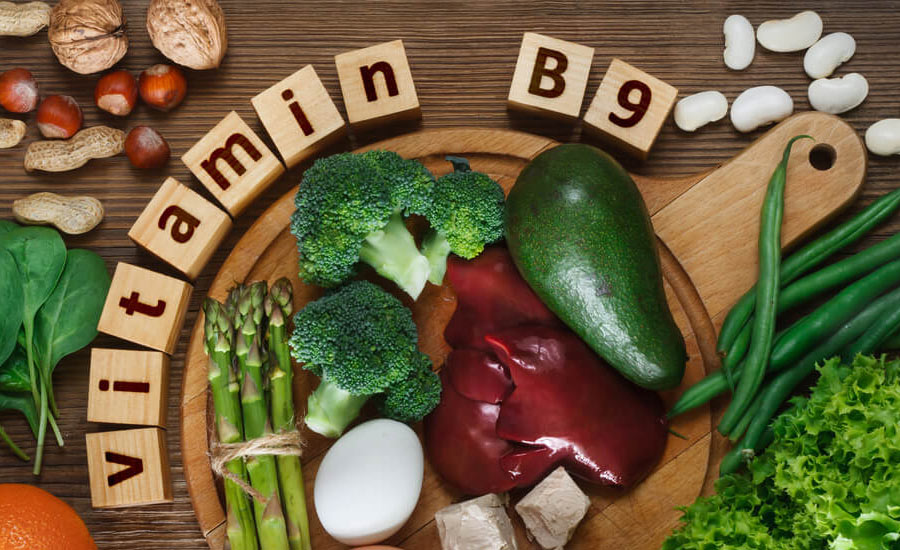

- Dark green vegetables: Green vegetables like spinach and lettuce will provide you with a daily amount of folate.
- Nuts: Imported nutritious nuts like sunflower seeds, almonds, walnuts, maca, and peanuts not only contain large amounts of omega 3s but also contain a lot of folates (vitamin B9). Just 1 cup of nuts can provide up to 300 mcg of Folate.
- Broccoli: Broccoli is not only one of the best detox foods, but it is also rich in folic acid. Just 1 cup of broccoli can provide about 24% of the daily requirement of folic acid. You should boil or steam to keep the whole nutrition of broccoli.
- Citrus fruits: Many fruits contain folic acid, but citrus fruits rank the highest. Orange is particularly rich in folic acid. An orange can contain about 50mcg, a glass of orange juice even contains more. Other folate-rich fruits include papaya, grapefruit, grapes, bananas, and strawberries.
- Asparagus: This is also a food that has the highest amount of folic acid. Just 1 cup of boiled asparagus can provide 252 mcg of folic acid, equivalent to 65% of the daily folic acid requirement. Not only that, but asparagus also contains many important nutrients such as vitamin K, Vitamin C, vitamin A and manganese
- Beans: Legumes, especially peas, are extremely high in folic acid.
- Avocado: Each cup of avocado you eat provides 90mcg of folate, which makes up 22% of the daily intake. Not only is avocado high in folate, but it is also high in fatty acids, vitamin K and fiber.
- Cauliflower: Just 1 cup of cauliflower will give you about 55 mcg of folate accounting for 14% of the recommended value per day. In addition to folic acid supplements, the amount of fiber in cauliflower will help pregnant women avoid constipation.
- Egg yolk: Chicken eggs are a nutritious food, including protein, vitamin A, vitamin D … besides it also contains many folic acid and iron, zinc, which are essential for both pregnant and children to develop healthily.
1.6 Vitamin B12 foods list


- Eggs: Eggs contain an excellent source of vitamin B12. They contain zeaxanthin and lutein antioxidants which are good for eyes and general health. An egg contains 6mg of vitamin B12. However, the amount of vitamin B12 in egg yolks will be more than egg whites.
- Dairy products: Milk and milk products such as cheese, yogurt, butter, … contain very high levels of vitamin B12. Each cup of milk contains nearly 20% of this daily vitamin requirement. These dairy products contain a lot of protein, several vitamins, and minerals. Researchers have shown that the body absorbs vitamin B12 in milk and dairy products better than vitamin B12 in beef, fish, or eggs.
- Fish: All types of fish provide a lot of nutrients for the body. Fish is an excellent food that is always present in the diet. In particular, fish such as tuna, sardines, and salmon contain a good source of vitamin B12, providing fatty acids and omega 3s, proteins, … that help nourishes the body in the best way.
- Seafood: Seafood in general contains a lot of nutrients. Vitamin B12 is found in crab, oysters, oysters, and shrimp. Clams are a good source of protein and contain very high levels of vitamin B12.
- Meat: Chicken and beef contain a lot of protein that helps in muscle building and healthy body development. Beef contains lots of vitamins B12, vitamins B2, B3, and B6, selenium, and zinc. Beef is better used when grilling rather than fried, which helps preserve vitamin B12 content. 300gr of chicken contains about 3mg of vitamin B12.
- Animal Organs: You may not know it is an excellent source of nutrition. This nutrient is usually rarely used. However, they contain the highest amount of vitamin B12, especially in the liver and kidneys of sheep, cows, or calves.
- Whole grains: Whole grains are a great source of nutrition for vegetarians. Cereals are not derived from animals but they also provide quite a lot of vitamin B12, which is great for vegetarians when their diet is not qualified to provide vitamins and minerals for the body. Whole grains made from barley can provide up to 30% of the body’s daily requirement of vitamin B12.
- Nutritional yeast: Nutrition experts believe that vegetarians should supplement this food because it increases the amount of Vitamin B12 in the blood and reduces the signs of anemia of the body. Nutritional yeast is great for vegetarians because it is synthetically produced.
2. Daily requirement of vitamin B
✅ How much vitamin B do you need a day? Here is the daily requirement of B vitamins for adults, You can get B vitamins by using natural foods or vitamin B-complex supplements :
- Vitamin B1: 1.1 to 1.2 mg per day
- Vitamin B2: 1.1 to 1.3 mg per day
- Vitamin B3: 14 to 16 mg daily
- Vitamin B6: 1.3 to 1.7 mg per day
- Vitamin B9 (Folate): 400 micrograms daily
- Vitamin B12: 2.4 micrograms per day
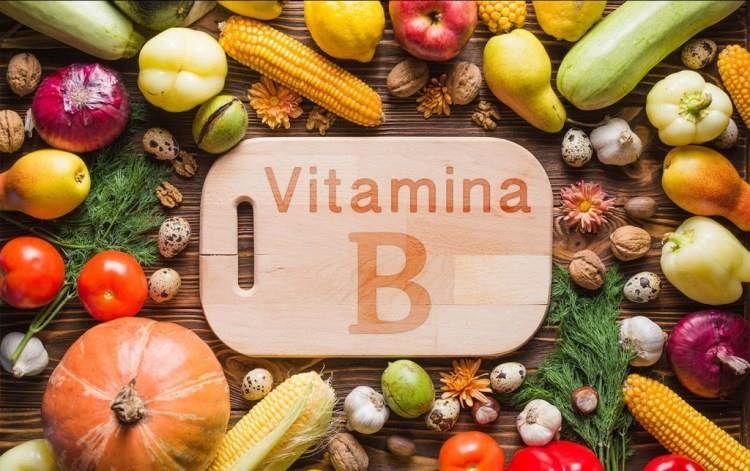
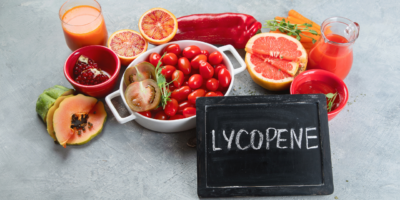
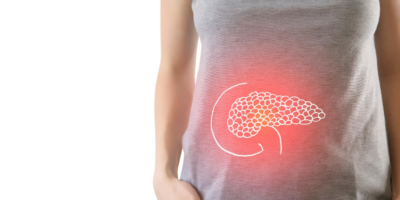
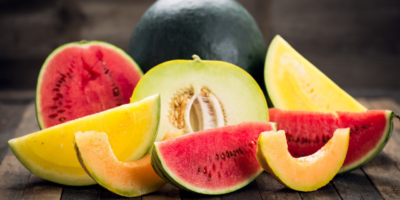
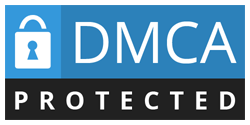

Leave a Reply